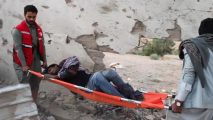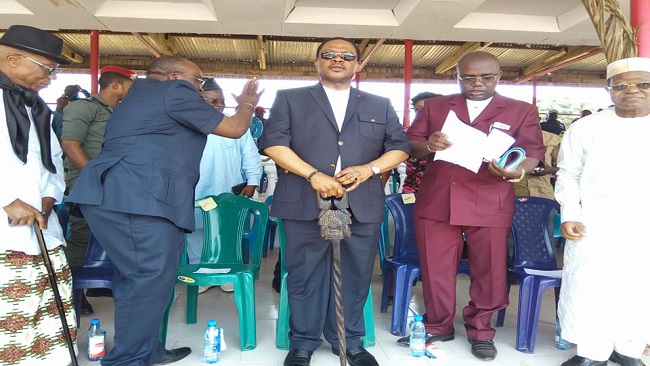Categories
Recent Posts
- Football: Dembele goal gives PSG narrow advantage over Arsenal in Champions League
- US: Trump addressing rally in Michigan as he marks 100 days in office
- Vatican: Conclave to elect new pope will start on May 7
- Namibian minister sacked after being accused of rape
- Dozens of African migrants killed in US strike on Yemen
Archives
- April 2025
- March 2025
- February 2025
- January 2025
- December 2024
- November 2024
- October 2024
- September 2024
- August 2024
- July 2024
- June 2024
- May 2024
- April 2024
- March 2024
- February 2024
- January 2024
- December 2023
- November 2023
- October 2023
- September 2023
- August 2023
- July 2023
- June 2023
- May 2023
- April 2023
- March 2023
- February 2023
- January 2023
- December 2022
- November 2022
- October 2022
- September 2022
- August 2022
- July 2022
- June 2022
- May 2022
- April 2022
- March 2022
- February 2022
- January 2022
- December 2021
- November 2021
- October 2021
- September 2021
- August 2021
- July 2021
- June 2021
- May 2021
- April 2021
- March 2021
- February 2021
- January 2021
- December 2020
- November 2020
- October 2020
- September 2020
- August 2020
- July 2020
- June 2020
- May 2020
- April 2020
- March 2020
- February 2020
- January 2020
- December 2019
- November 2019
- October 2019
- September 2019
- August 2019
- July 2019
- June 2019
- May 2019
- April 2019
- March 2019
- February 2019
- January 2019
- December 2018
- November 2018
- October 2018
- September 2018
- August 2018
- July 2018
- June 2018
- May 2018
- April 2018
- March 2018
- February 2018
- January 2018
- December 2017
- November 2017
- October 2017
- September 2017
- August 2017
- July 2017
- June 2017
- May 2017
- April 2017
- March 2017
- February 2017
- January 2017
- December 2016
- November 2016
- October 2016
- September 2016
- August 2016
- July 2016
- June 2016
Featured
Most Commented Posts
 4 Anglophone detainees killed in Yaounde
4 Anglophone detainees killed in Yaounde
18 comments Chantal Biya says she will return to Cameroon if General Ivo Yenwo, Martin Belinga Eboutou and Ferdinand Ngoh Ngoh are sacked
Chantal Biya says she will return to Cameroon if General Ivo Yenwo, Martin Belinga Eboutou and Ferdinand Ngoh Ngoh are sacked
13 comments The Anglophone Problem – When Facts don’t Lie
The Anglophone Problem – When Facts don’t Lie
12 comments Anglophone Nationalism: Barrister Eyambe says “hidden plans are at work”
Anglophone Nationalism: Barrister Eyambe says “hidden plans are at work”
12 comments Largest wave of arrest by BIR in Bamenda
Largest wave of arrest by BIR in Bamenda
10 comments
Latest Tweets
Featured
-

Football: Dembele goal gives PSG narrow advantage over Arsenal in Champions League
-

US: Trump addressing rally in Michigan as he marks 100 days in office
-

Vatican: Conclave to elect new pope will start on May 7
-

Namibian minister sacked after being accused of rape
-

Dozens of African migrants killed in US strike on Yemen
-

Manyu Division: A new path is possible
-

Who will be the next pope? Key candidates in an unpredictable process
© Cameroon Concord News 2025





25, July 2024
Stepping up efforts to check child labor in African cocoa-producing communities 0
Child labour is a common phenomenon in African cocoa-producing communities, most of which are in West and Central Africa. The use of child labour in cocoa-producing communities is spurred by poverty which impedes efforts by farmers to employ adult labour for their cocoa production.
According to the World Cocoa Foundation, “Cocoa is grown by millions of smallholder farmers with a high prevalence of poverty. Many cocoa-growing families have no choice but to put their children to work because they cannot afford other sources of labour and it is often an accepted cultural practice to help keep the farm running.”
Though culturally accepted in African cocoa producing communities, the World Cocoa Foundation is striving to remedy this situation to give children in cocoa-producing communities a chance to have a normal childhood and an opportunity to get the education they need to make informed decisions later in life by establishing broad coalitions with other key sector stakeholders.
In a message on its website, WCF has indicated that it has been working with several key actors to give children in those communities a new lease on life. “In broad coalition with governments, companies, and development organisations, a layered approach has been adopted. The primary goal is to combat child labour through a diverse set of solutions. These include efforts to confirm that children possess a birth certificate and have access to quality education. Child labour monitoring and remediation systems have been leveraged as essential tools, focusing on mitigation and providing remediation support to children involved in, or at risk of, child labour. Efforts also extend to assisting their families and communities in addressing the underlying challenges and poverty, one of the primary root causes of child labour. To address the issue of child labour we are working with our partners help increase farmers’ incomes in rural areas,” the WCF said.
WCF and its partners are setting up child labour monitoring and remediation systems to help authorities identify child labour issues and address in a timely fashion and appropriately.
“Child labour monitoring and remediation systems are set-up in order to identify and address child labour. They can be embedded in a company’s supply chain or at community level. It involves systematic monitoring, identification of child labour risks and remedial actions such as education and alternative livelihood support,” WCF stressed.
Meanwhile the World Cocoa Initiative, for its part, has undertaken a series of measure to help with efforts to check child labour. Among those efforts are the training of community members to monitor and report on the commitments of government and companies on child labour – to strengthen accountability towards local communities and their voice in global debate; the engagement with Government and local authorities to identify needs and strengthen systems to prevent, identify and address child labour and forced labour risk; setting up an online platform through which cooperatives, farmer and gold mining associations/groups can access free piloted, validated tools and training materials to improve their systems to prevent, identify and address forced labour; while at the same time allowing policy makers, law enforcement agencies and relevant government ministries to access dedicated platforms to strengthen their work.
The World Cocoa Initiative is also promoting good practices with supply chain actors at the national and international level, while building the capacity of community-based organizations to strengthen advocacy and accountability in the tracking of government commitments. It is also organizing community-based awareness raising activities with community members, in particular women and vulnerable groups, on forced labour indicators, child labour, rights and access to social services; providing hands-on trainings in alternative livelihood activities for cooperatives and at-risk vulnerable families and the setting up of Village Savings and Loans Association in Ghanaian cocoa-producing communities; and setting up a remediation fund to support child labour victims.
Also, with funding from the Norwegian Government through the Norwegian Agency for Development Cooperation, ICI, Solidaridad and the Rainforest Alliance are collaborating to address child labour and forced labour in the cocoa supply chain and gold-mining communities in Ghana.
By Cecilia M. Manjang